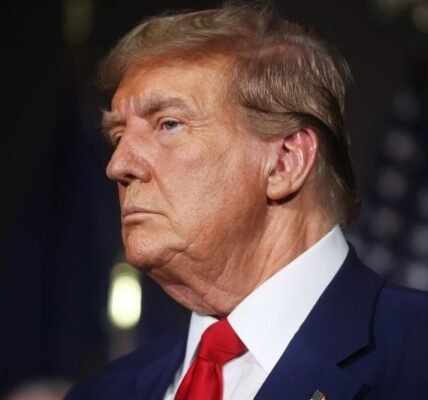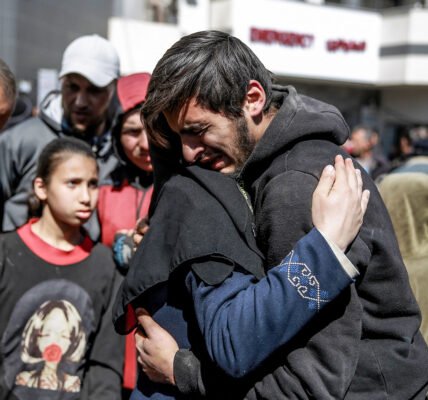Secrets of Diddy’s billionaire boys club: Rapper wooed Wall Street elite — who praised him as ‘genius’ before sex trafficking probe – New York Post
Sean “Diddy” Combs aggressively marketed himself to the ultra-rich as he turned his edgy rap glamor into a billion-dollar fortune.
Billionaires told The Post he would cold email with business proposals, while other Wall Streeters acclaimed him as a “genius” and one CEO of the New York Stock Exchange called him an “inspiration” on a par with the Founding Fathers.
But after federal investigators raided his Los Angeles and Miami homes as part of what law enforcement sources have told The Post is a sex-trafficking investigation led by the Southern District of New York, his career as an entrepreneur and investor is in jeopardy. Diddy has denied wrongdoing and called the probe “a witch hunt.”
Diddy was first declared a billionaire by hip-hop wealth expert Zack O’Malley Greenburg in 2022, but had coveted the status for years, telling Forbes in 1999, “I wanted to be very, very rich.”
Along the way he acquired a Rolodex littered with bold-faced names: he partnered with billionaire investor Ron Burkle; was “mentored” by hedge fund guru Ray Dalio; had his fashion line sold in Macy’s and Dillards; went into business with alcohol giant Diageo; opened the New York Stock Exchange with Estée Lauder heir William Lauder; struck deals with Zac Posen and Liz Claiborne; 50% owned his own TV channel Revolt; launched a water range with Mark Wahlberg; and teamed up with Salesforce’s Marc Benioff to launch a black business marketplace.
In 2003, he sent the then owner of the Dallas Maverick Mark Cuban an email asking to design the uniforms for the NBA team, Cuban told The Post. They had never met so the cold email was a bold move.
For Diddy, it was a slam dunk to associate his new clothing brand, Sean John, with a pro sports team.
While Diddy took credit for the design, it was actually Diddy’s top designer who created it and Diddy signed off, Cuban said.
“We were an up and coming team at a time when pro sports teams didn’t do anything with entertainment industry people,” Cuban said.
“We never even met… we never did any follow up or anything beyond that,” Cuban said.
For Diddy — who had gone to Howard University to study business — a single deal with an NBA team gave him credibility that he leveraged for even more dealmaking.
But it was a two-way street: Diddy also used his own cache — the promise of entry into a world of celebrity — to attract investment for his projects.
The same year as his Mavericks deal, Diddy got Burkle, a serial investor worth an estimated $2.9 billion according to Forbes, to inject $100 million into his fashion range Sean John.
It was to become Diddy’s longest-standing Wall Street relationship. After it was done, they partied with Michael Jackson — while Sean John became a fixture in Macy’s and Dillards stores.
The next year the rapper teamed up with Estée Lauder to create multiple fragrances, including one that was named “Unforgivable.”
The move gave him instant social cache. It let him rub shoulders, lucratively, with a New York social dynasty and in turn gave their decades-old brand a fresh, contemporary glamor associated not just with rap music, but his celebrity-packed White Parties in the Hamptons.
The company was thrilled with the partnership and chief operating officer William Lauder said Diddy was a “man who has built a phenomenal reputation as a tastemaker in music, in fashion and in business.”
The Lauder and Macy’s deals were celebrated with Diddy ringing the New York Stock Exchange’s opening bell in 2003, a sign of his power and influence.
Analysts said Diddy was one of the first celebrities to essentially license his name to brands — and companies were able to draw on that to reach a more diverse group of customers.
In 2007, he was approached by the alcohol giant Diageo to become a brand spokesperson for its Cîroc vodka.
But he countered by proposing he become brand manager and chief marketing officer in return for a 50% profit share — and even had the business cards made up for his new role before the deal was done.
The vodka brand agreed. He missed no opportunity to promote it — with the deal paying him nearly $1 billion over the next 15 years and turning Cîroc into a hugely successful brand.
The savvy negotiations led many in Hollywood to respect Diddy’s acumen. “He was a master entrepreneur,” one music business insider — who said the rapper was widely respected in Hollywood as a businessman — told The Post.
“He was a super intelligent hardworking guy and a genius at brands… he turned Cîroc into a billion dollar business.”
When he rang the NYSE bell in 2016 as a representative for Cîroc, then NYSE president Tom Farley said Diddy was “an inspiration” to him and similar to the Founding Fathers since they were both hustlers.
The comments were written up by Diddy’s own news website Revolt, which often reported favorably on its co-founder.
But the Diageo relationship ended in rancor in 2023 with Diddy accusing the multinational of racism; the case was settled in January with Diageo now sole owner of Cîroc and DeLeón tequila.
In 2015, Diddy again teamed up with Burkle and also with boyband heartthrob turned movie star Mark Wahlberg, to buy now defunct water company AquaHydrate.
Once again, Diddy promoted it energetically, appearing on both coasts with Wahlberg.
At least on paper, Burkle had the longest relationship with Diddy of any of his business partners. He has not commented on the allegations against Diddy.
Earlier this year Burkle, a one time close friend of former president Bill Clinton, was linked to another alleged sex trafficker when he was listed in an unsealed court filing naming people associated with Epstein. There is no suggestion Burkle engaged in wrongdoing.
Diddy also forged a relationship with Dalio, who as well as founding Bridgewater, the world’s largest hedge fund, has a personal net worth of $15.4 billion, according to Forbes, and has become a sought-after guru for his principle of “radical transparency.”
In 2017, at a Forbes gathering for the “100 Greatest Living Business Minds,” Diddy approached Bridgewater founder Ray Dalio and started peppering him with business questions.
Diddy was a frequent attender at business events. His celebrity rider included his own drink brands and “a young Thai coconut.”
Dalio tweeted in 2019 that Diddy “asked me to mentor him” and posted a slickly-produced video of a “recent mentor session of ours.”
″[H]e’s a real hero,” Dalio said. “And he wants to be a role model and help others.”
“The greatest joy I’m having now is helping other people to be successful, particularly helping people who can help a lot of people. Sean Combs, also known as @Diddy, is one such person,” Dalio posted, boosting Diddy to 1.3m followers looking for financial wisdom.
In 2021 Diddy teamed up with tech mogul Marc Benioff, CEO of Salesforce, who Forbes estimates to be worth $10.5 billion, to launch “SHOP CIRCULATE,” a marketplace for black-owned businesses.
That same year he launched a similar online marketplace, Empower Global.
“Building Black wealth starts with investing in Black-owned businesses and giving entrepreneurs access to the consumers needed to build sustainable companies that can thrive,” Combs said.
He told Billboard magazine last year that he wants to collaborate with Byron Allen, the TV mogul, and billionaire Hollywood director Tyler Perry to create a “black-owned media conglomerate,” although neither struck any deals with him.
After Diddy was accused by his ex Cassie of rape, sex trafficking, and domestic violence last November, and settled the suit without admitting her claims, brands began distancing themselves.
Macy’s, which still carried his fashion line, said they would stop selling his products. And 18 companies selling products on Empower are reported to have left the platform in recent months.
















